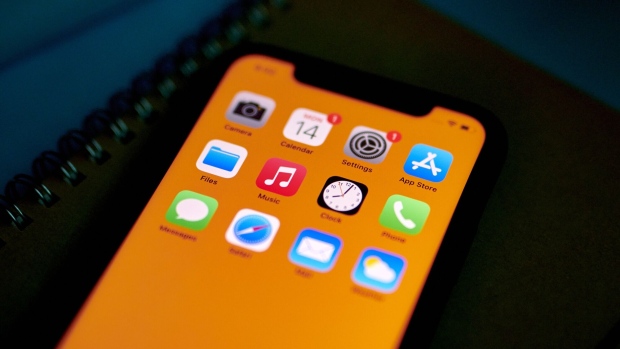Mar 5, 2024
Apple on Collision Course With EU as New Digital Markets Act Kicks In
, Bloomberg News

(Bloomberg) -- Apple Inc.’s troubles in the European Union are just beginning, even after it was hit with the third largest antitrust fine ever doled out by the bloc.
This Thursday, the EU is betting that a new sweeping law will rein in the excesses of Apple and some of the world’s most dominant tech firms after decades of market dominance that the bloc struggled to contain.
The Digital Markets Act will force the likes of Alphabet Inc.’s Google Search, Apple’s App Store, Amazon.com Inc.’s marketplace and Meta Platforms Inc.’s Facebook to heed a strict list of do’s and don’ts — or face the threat of significant fines.
The world’s most ambitious digital regulation is being closely watched by other nations, including Japan, South Korea, Turkey and the UK, which are contemplating their own versions.
Under the DMA, it will be illegal for certain platforms to favor their own services over those of rivals. They’ll be barred from combining personal data across their different services, prohibited from using data they collect from third-party merchants to compete against them, and will have to allow users to download apps from rival platforms, among other limits and obligations.
Apple, fresh from its €1.8 billion ($2 billion) fine for shutting out music streaming rivals, will come under fresh scrutiny after it announced an overhaul of its iOS, Safari and App Store offerings in the EU, which the European Commission is likely to investigate further to determine whether they fall in line with the rules.
The commission said that it “will not hesitate to take formal enforcement action, using the entire toolbox, to fully enforce the DMA.”
Apple didn’t immediately responded to a request for comment.
Read more: Apple Hit With €1.8 Billion EU Fine Over Music App Abuses
Fines for violating these rules can amount up to 10% of a company’s total annual worldwide revenue, and up to 20% for firms who repeatedly flout the rules. Apple reported revenue of $119.6 billion in the first quarter, including $69.7 billion from the iPhone alone, with sales from the device up 6% from a year ago.
When it comes to the App Store, the Cupertino, California-based firm has made efforts to restructure the fees it charges developers since it scrapped the 30% commission it has historically imposed. Still, those changes don’t go far enough for some competitors.
Spotify, which triggered the initial EU complaint over the App Store, said Apple’s DMA proposals were “unacceptable” and “nonsensical” and requested a meeting with the EU’s competition chief Margrethe Vestager to discuss Apple’s plans, according to a letter from Spotify chief Daniel Ek seen by Bloomberg News.
Read more: Europe’s Two-Track Approach to Policing Big Tech: QuickTake
“Apple’s App Store fee structure is almost certain to draw scrutiny from the European Commission,” said Bloomberg Intelligence analyst Tamlin Bason. “Spotify and other developers are already asking that swift action be taken against Apple.”
Another company expected to face early EU scrutiny is Meta, with its new pay-or-consent policy to introduce separate, ad-free versions of Facebook and Instagram likely to get questions from Brussels regulators.
Meta made the changes in November to ward off growing regulatory pressure over its processing of users’ personal data, but the subscription-based model could rub up against the DMA’s new limits on platforms to process personal data for advertising purposes.
Despite what will likely be lengthy litigation that comes out of the changes, the DMA has already started to have the intended impact.
On Tuesday, Google announced it would link more in search to comparison sites in areas like flights, hotels and shopping in addition to providing more choice screens on Android devices. Meta previously pledged to allow Facebook and Instagram services to be unlinked, and Microsoft Corp. has said that some programs normally bundled with Windows will in the future be able to be uninstalled.
Other well-known platforms are set to face growing scrutiny under the regulation too. Last week, Elon Musk’s X and Booking Holdings Inc.’s accommodation platform both informed the Brussels-based watchdog that they might meet the DMA’s criteria.
But Big Tech players are also gearing up to challenge the DMA through the bloc’s courts. Apple, Meta and TikTok are all fighting their designations as “gatekeepers” under the rules.
TikTok owner ByteDance Ltd. last month lost a court bid to suspend the EU’s decision while the appeal is pending, forcing the video-sharing app social-media platform to comply with DMA.
Ultimately, the outcome of these lawsuits years into the future will define whether the DMA and Vestager’s big gamble is a success.
“The most significant challenge is from Apple, because it challenges one of the DMA’s rules, which requires it to give app developers the same ability to use iPhone functions which Apple reserves to itself,” said Zach Myers, the assistance director for competition at the Centre for European Reform. “But even if that case succeeds, most of the DMA will still be in force.”
(Updates with commission comment in the seventh paragraph)
©2024 Bloomberg L.P.





